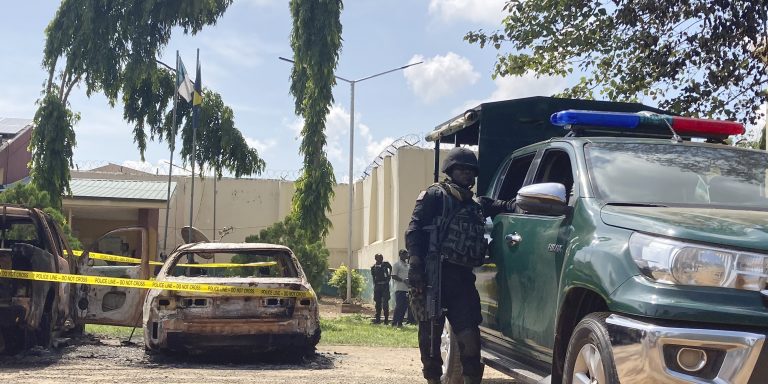INTELBRIEF
July 11, 2022
IntelBrief: ISWAP Engineers Prison Break in Nigeria in Signs of Renewed Offensive

Bottom Line Up Front
- Islamic State in West Africa Province’s (ISWAP) prison break in Nigeria’s capital shows the insurgency in the northeast is not only far from defeated, but that ISWAP is increasingly capable of executing complex operations in central Nigeria.
- The freeing of fighters from rival factions leaves ISWAP with an opportunity to either exact retribution against them, or swell their ranks by pressing their adversaries into service.
- Nigeria’s inability to quell ISWAP’s insurgency, let alone prevent its most important prison from being attacked, raises serious questions about the effectiveness of the country’s institutions and security forces.
- For an Islamic State struggling in the Middle East, major prison breaks like in Congo in 2020 and now in Nigeria, serve as morale boosts for IS, especially as its propaganda continues to highlight African expansion.
On July 5, Islamic State in West Africa Province (ISWAP) raided Kuje Prison, on the outskirts of the Nigerian capital of Abuja, freeing more than 400 prisoners. While some inmates have voluntarily returned to the prison, Nigerian officials have confirmed that 64 “Boko Haram” members have escaped. This figure likely includes fighters from three distinct groups: ISWAP; the non-affiliated and formerly Abubakar Shekau-led, Jamaat Ahlus Sunna li-Dawa wal Jihad (JASDJ) (Shekau was killed during an ISWAP offensive against him in 2021); and Ansaru, an al Qaeda affiliate. Since not all escapees were ISWAP fighters, it remains to be seen what the jihadist group will do with members belonging to its rivals. ISWAP leadership may attempt to overcome past divisions and integrate the liberated fighters into their organization, or they may execute them, as ISWAP has previously done with JASDJ and Ansaru members it has captured.
On a practical level, the prison, which was billed as Nigeria’s most secure facility and touted as the “showcase” for jihadists in de-radicalization programs, has now been exposed for lacking adequate security measures. Moreover, prisoners apparently deposited their money for commissary purchases in an informal bank run by prison staff, but now tens of thousands of dollars from that “bank” have been stolen. This will lead to greater friction between the remaining prisoners and their guards if nothing is done to compensate them. Of greater concern from a security perspective, the operation shows that ISWAP is now consolidating itself in central Nigeria. For the first time in the group’s history, it has carried out attacks in Kogi and Taraba, both in central Nigeria. Now ISWAP has struck the very center of the country, Abuja, which for years had been considered Nigeria’s “Green Zone.” Indeed, for over ten years, the capital city has remained largely out of the reach of ISWAP, JASDJ, and Ansaru. Recent attacks on churches and bars in Kogi could have indicated the presence of small, transient ISWAP cells in central Nigeria, but the planning and logistics associated with this prison break prove ISWAP must have consolidated its presence by establishing support networks in and around the capital.
According to Nigerian defense officials, the operation was fairly complex. ISWAP fighters breached the prison’s perimeter wall with explosives, then sent teams into the prison to free the prisoners. Simultaneously, separate elements had isolated the prison by blocking surrounding roadways, preventing Nigerian security forces from reinforcing the area. Prison breaks like this one are a common occurrence in Nigeria, however, it is significant that this raid did not occur in ISWAP’s northeastern Nigerian heartland but in the Nigerian capital itself. Any claims the Nigerian government has made about defeating ISWAP in the northeast have long been undermined by continued ISWAP attacks. With this recent attack in Abuja, ISWAP has proven even the capital can be threatened.
If there were any doubts about the Nigerian government’s often unreliable claims that ISWAP conducted the prison break, the group dispelled them by releasing a short video through Islamic State’s Amaq media agency showing its fighters carrying out the operation. In its claim, ISWAP declared that it “demolished the walls” of the prison, which is an IS idiom used to describe these kinds of operations. Although the original “Breaking the Walls” campaign took place in Iraq and Syria after the U.S. withdrawal from Iraq, prison breaks have become common practice for IS and its affiliates. In 2020, one such operation occurred in Congo and appeared to be closely coordinated between IS and Islamic State Central Africa Province (ISCAP). Prison raids reinforce IS’s promises to its loyalists that no matter how long they are detained whether in the Middle East, Africa, or elsewhere, IS fighters will eventually rescue them. This prison break will have important operational and morale consequences. For one, Kuje was the home to high-level ISWAP prisoners, so the group will be able to replenish its leadership cadre. Second, striking the Nigerian government in its “Green Zone” further delegitimizes and demoralizes Nigerian security forces, while inspiring ISWAP and other IS supporters worldwide. It remains to be seen, however, whether ISWAP can integrate the newly freed JASDJ and Ansaru prisoners in an effort to create unity in the Nigerian jihadist ranks, although given their acrimonious histories, this seems unlikely.